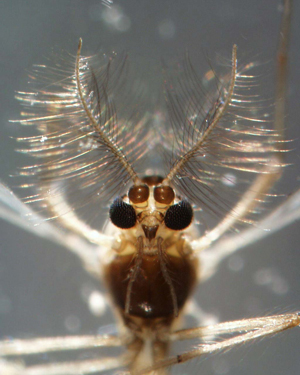Raising mosquitoes in the universe
After 12 months of being launched into space, up to 80% of Chironomidae mosquito larvae live healthy after the flight to the arduous ISS station.
This is the result published from the second Biorisk experiment that took place from 6/2007 to 7/2008 on the ISS International Space Station. Natalia Novikova, from the Institute of Biomedical Research, said: 'The results show that mosquito larvae can still live and carry out metabolic processes. This proves that the surface multicellular bodies can grow out of space for a long time. '

Mosquitoes Chironomidae, one of the most successful organisms in "captive" conditions on the ISS station.
The first Biorisk experiment was conducted within 18 months, showing that bacteria and spores can live in harsh environments in space. Experiments are more complicated. Previously tested bacterial bodies were placed with various plant pests, fish eggs, and larvae of the African Chironomidae species. These species can inherit harsh environments. 'These are special animals. Their larvae can tolerate the effects of radioactivity and alcohol, temperatures ranging from -270 to +106 degrees , "Natalia Novikova said.
Scientists were surprised after finishing the analysis of the Chironomidae larvae brought from the earth. Earlier, more than half of these were damaged as a result of the movement and impact of acceleration during the flight and landing of spacecraft. However, living larvae have survived and are gradually recovering with the help of biological measures. Up to 80% of children live healthy.
- Interesting findings about mosquitoes
- 10 interesting things about mosquitoes
- Why do humans not erase mosquitoes?
- Why do mosquitoes love to burn humans?
- Change the sex of the mosquito
- 'Eat - wear - stay' helps you kill mosquitoes thoroughly
- Why are mosquitoes sucking blood from HIV, mosquitoes not sick?
- The experiment destroyed most of the mosquitoes on the Chinese island
- Mosquitoes' mosquitoes to block malaria
- Spray mosquito repellent to watch for poisoning
- The paradox of flying mosquitoes makes them extremely scary
- Giant mosquitoes appear in the United States
 Van Allen's belt and evidence that the Apollo 11 mission to the Moon was myth
Van Allen's belt and evidence that the Apollo 11 mission to the Moon was myth The levels of civilization in the universe (Kardashev scale)
The levels of civilization in the universe (Kardashev scale) Today Mars, the sun and the Earth are aligned
Today Mars, the sun and the Earth are aligned The Amazon owner announced a secret plan to build a space base for thousands of people
The Amazon owner announced a secret plan to build a space base for thousands of people